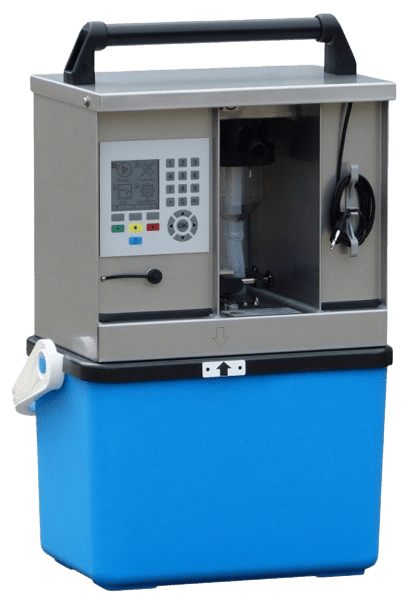
ISOTHERM PORTABLE SAMPLER AQUIBOX
AQUIBOX is an autonomous and modular water sampler offering vacuum or peristaltic sampling systems. A wide available range of bottles arrangements and long autonomy ensure efficiency and flexibility.
Learn moreDiscover our range of stationary and portable automatic samplers for monitoring wastewater, industrial and surface water, natural water, or drinking water. Our samplers can be purchased or hired
We can offer single or multi-bottle (glass or PE), isothermal or refrigerated devices that are set up in stationary or portable workstations. Our devices are fitted with a vacuum pump, meet the ISO 5667 standard and can be servo-controlled by flowmeters.
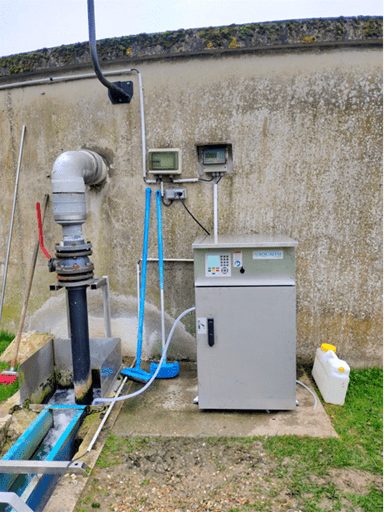
Discover our two isothermal hand-held samplers and all their features: AQUIBOX and AQUACOMPACT

AQUIBOX is an autonomous and modular water sampler offering vacuum or peristaltic sampling systems. A wide available range of bottles arrangements and long autonomy ensure efficiency and flexibility.
Learn more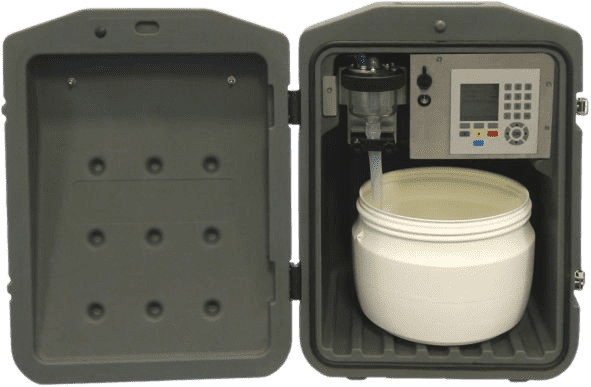
AQUACOMPACT is a robust and easy to transport autonomous isotherm water sampler with vacuum pump sampling system for composite sampling. Sampling can be time or volume proportional, or event based.
Learn moreChoose high performance with our AQUIFROID refrigerated portable sampler. Available in standard or SR&ED versions.
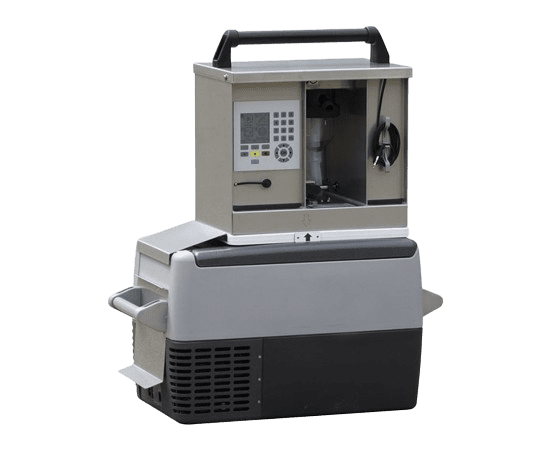
AQUIFROID is a compact, rugged, and easily transportable autonomous refrigerated water sampler. Sampling can be time, volume or event-based, and sample integrity is ensured by built-in refrigeration.
Learn moreSelect either of our stationary samplers for the regulatory monitoring of your urban wastewater and industrial effluents.
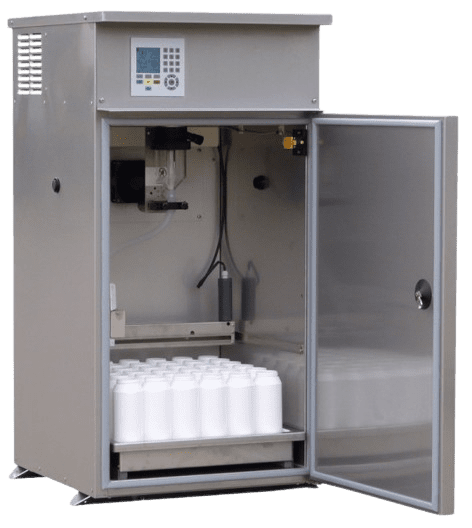
AQUINOX is a versatile and rugged stationary water sampler with a large sample storage capacity. Its durable construction and customizable features make it ideal for a variety of applications.
Learn more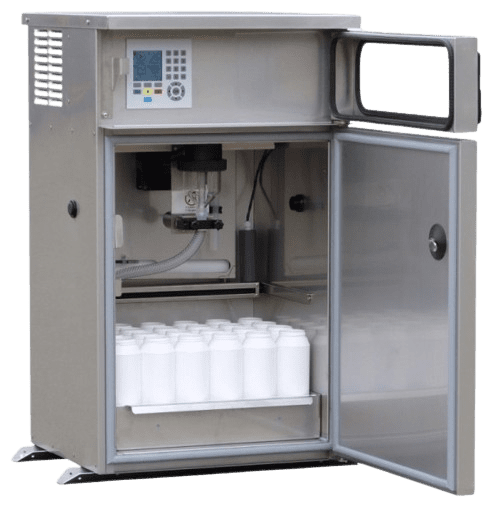
BABYNOX Eco is a compact and robust stationary water sampler made of 304 stainless steel. Equipped with a vacuum pump sampling system, it ensures accurate, reliable sampling under difficult conditions.
Learn moreAutomatic water samplers offer accurate and programmable collection, reducing the risk of human error. They allow regular, in-depth and on-going monitoring of water quality, reduce risk for operators, and automate repetitive tasks. They facilitate long-term analysis of water quality.
The choice between a stationary or portable automatic water sampler depends on the nature of your study. A stationary sampler is suitable for long-term monitoring, permanent installations, and integration with other devices. It offers stability and cost reduction at specific locations. On the other hand, a portable sampler is ideal for mobility, temporary operations, and site variability. Consider the frequency of travel, need for on-going monitoring, and flexibility required. The choice will be guided by the specific requirements of your mission and the changing characteristics of your study site.
Automatic water samplers offer significant advantages over manual methods. They ensure accurate, regular and automated sample collection, eliminating human variation. Programming enables on-going monitoring and detection of temporary changes. These devices reduce the risk to users by minimizing exposure to hazardous conditions. They also automate repetitive tasks thereby optimizing the use of resources. In addition, some models protect sample integrity through cooling. In short, automatic samplers improve efficiency, accuracy and safety when collecting water samples.
It is essential to use a refrigerated auto-sampler to ensure sample integrity and accurate analytical results. By maintaining a low temperature, this device protects the stability of volatile compounds to prevent their degradation. This is crucial for heat sensitive analyses such as detecting organic contaminants. In addition, low temperature storage inhibits bacterial growth, thus protecting the microbiological quality of samples.AQUALABO refrigerated samplers are particularly useful in long-term studies, where protecting the chemical and biological properties of samples is crucial. They are also vital in stringent environmental applications, where compliance with water quality standards is required. In summary, using a refrigerated sampler provides optimal sample protection, to ensure the validity of chemical and microbiological analyses, and thus meet the strict requirements of long-term water quality monitoring.
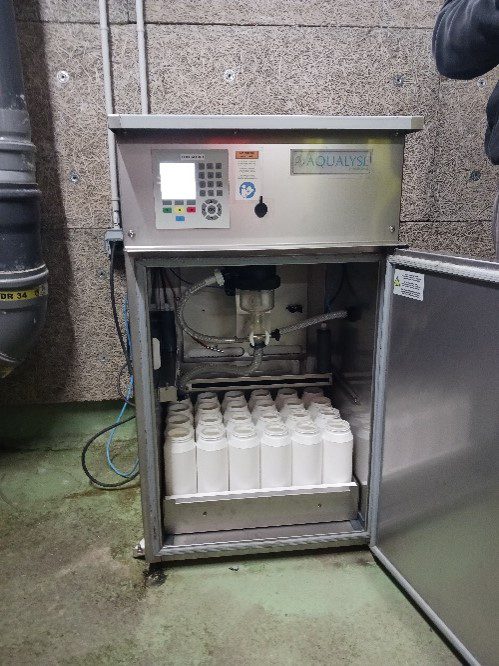
AQUALABO samplers are low maintenance. Their upkeep involves simple tasks such as regular cleaning of components and glass chamber, periodic replacement of the spill tube and checking connections. By following the recommended procedures, you will ensure optimal operation and extend the life of the device.
The water samplers can be connected to other measuring instruments such as flowmeters (flow servo-control), or to physical-chemical sensors, with sampling triggered at a certain threshold (event servo-control).
AQUALABO samplers comply with the ISO 5667 standard, which governs the framework and use of samplers. They ensure compliance with standards by facilitating representative sampling for physical-chemical and microbiological analyses. These devices thus contribute to the efficient monitoring of water quality, ensuring reliable results in compliance with international and local standards.
The choice between a single or multi-bottle automatic water sampler depends on the specific needs of your study. A single bottle sampler is suitable for simple tasks at low cost; ideal for single analyses. On the other hand, a multi-bottle sampler gives increased flexibility for complex studies requiring simultaneous sampling at various depths or locations. You should take in account the variety of samples, frequency of analyses, and versatility required. The choice will depend on the complexity of your project and your sample collection requirements.
The compatibility of an auto-sampler with various analytical methods depends on its design, sample characteristics and specific method requirements. In general, these devices are designed to be versatile; suitable for techniques such as spectrometry, chromatography or PCR. However, checking compatibility with the specific technical requirements of each method and sample characteristics is recommended to ensure the successful integration into your analytical process.
AQUALABO is a French manufacturer of instrumentation and chemical reagents for the control and analysis of water quality.
Contact us
© Aqualabo 2023 - All rights reserved